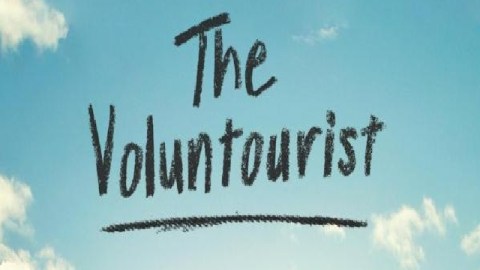The Voluntourist: A Q&A with Ken Budd

In the past year, there have been a few studies that suggest that volunteer work is as healthy for the aging body and brain as exercise and the right diet. In that spirit, I spoke with Ken Budd, executive editor of AARP, the Magazine, and author of the new book,The Voluntourist: A Six-Country Tale of Love, Loss, Fatherhood, Fate and Singing Bon Jovi in Bethlehem, about the benefits of volunteering abroad, the importance of small gestures and the gift of unexpected underwear.
Q: Some researchers say that volunteering is good for your brain. Do you find that your voluntourism experiences enriched your brain power in any way?
Ken Budd: Every time I volunteered, whether it was China or Kenya, I’d show up and think, “Oh my goodness—I’ve made a terrible mistake.” Because I always felt inadequate and out of place and ill-equipped to do the work. In Costa Rica my wife and I taught English and we thought we’d be helping a teacher—until we got to the school and discovered that we were the teachers. So I was usually in major “uh-oh” mode the first few days, and it was only when I got home that I’d realize… wow. That was really special. And I think anything that does that—anything that pulls you from your comfort zone—is good for you mentally, spiritually, emotionally. Our brains need challenges, and voluntourism forces your brain to work in a different way. These trips are good for improving relationships, too. When my wife volunteered with me, it was fun—and enlightening—to see ourselves outside of our usual roles.
Q: Do you think a foreign trip is more taxing in that way?
Ken Budd: Definitely. I worked for two weeks at a special needs school in China, and the special needs part alone would have been intense, because I have no experience with that. But I don’t speak Chinese, either, so I couldn’t understand the teachers, I couldn’t understand the students, I couldn’t read anything—that made it much more difficult. I brought a notepad and after about a half hour my first day I wrote, “culture shock overload.” That’s how it felt. It’d be like showing up for your first day of a new job and discovering that everyone speaks Klingon.
Q: What do you think people need to consider before taking part in a voluntourism trip? Any red flags they should watch out for?
Ken Budd: Look for an organization that has ties to the local community: You want an org that’s creating partnerships rather than dependencies. I went with pretty established groups like Earthwatch, Cross-Cultural Solutions, and Global Volunteers—they’ve been doing this a long time and they have strong local ties. And I always recommend contacting previous volunteers. Find out what the experience was like, what were the accommodations like, was the work they did helpful, and so on. Also ask the organization how your money will be spent. You’ll typically pay a program fee that covers your room, your food, local transportation, etc., but that money also covers the organization’s operating expenses. You’ll usually be asked to fill out a form on your skills or write an essay about why you want to volunteer, and you may need to undergo a background check if you’re working with kids. If an organization doesn’t ask you to do those things, that’s another warning sign. I’ve got a lot of resources on my web site: http://www.thevoluntouristbook.com/get-help-give-help/
Q: What is the most important lesson you learned from your trips?
Ken Budd: I learned that there’s power in small gestures and small acts of kindness. I was skeptical about whether you could actually do any good with these two-week trips, but in Costa Rica, I was told that parents in many Third World countries will send their kids to school—rather than to work—simply because foreigners are there. So sometimes you make a difference simply by showing up. In China, I worked at a special needs school with a friend, and I always thought our greatest contribution was just being there. The teachers work difficult jobs and we were English-speaking novelties; a break in their routines. After we left, I learned that one of the teachers said, “We seem to laugh more when volunteers are here.” And I certainly wondered about my usefulness in New Orleans, because you see the scale of the devastation, and you’re holding your little paintbrush, and you think… How can this possibly help? But I had an epiphany one day. I was scraping a backyard shed and I told myself this: if you don’t scrape the shed, you can’t paint. And if you can’t paint, you can’t finish the house. And if you can’t finish the home, the owner can’t move back in and the organization—Rebuilding Together—can’t move to a new project. So small gestures can become large gestures, especially when you add them up: Over 18,000 volunteers have worked for Rebuilding Together in New Orleans since 2005.
Q: You say you volunteered originally because you wanted to live a life of meaning. Do you now feel like your life has that “meaning” you originally sought out?
Ken Budd: Yes, but not in the way I expected. The first line of the book is a declaration: “I want to live a life that matters.” But in Kenya I rethought this. There was a little boy at the children’s home named Elijah: He was only two, but he’d already led a difficult life. He was the product of incest, which brought shame to the family, so we spent the first year of his life in isolation—no nurturing, no cuddling, no love. And whenever I held Elijah—he’d frequently run up in a bowlegged way with his arms up—I’d realize so clearly that every life matters. And every life has meaning. And we live a good life in the simplest of ways: by being a good friend, a good spouse, a good Earthling. By not, you know, being an a**hole. “Success comes from helping others succeed,” my father once told me, and I think that’s a pretty good approach to life.
Q: In the book, you talk about receiving an unexpected gift — someone else’s underwear — in your laundry in China. Do you still have the Chinese underpants?
Ken Budd: I shouldn’t admit this, but not only do I still have the mystery Chinese underpants, but I still wear them. In fact, I wore them at some of my bookstore events, though I didn’t announce this to the audience. I thought it might creep people out if I said, “Thank you for coming. I stand before you tonight wearing another man’s underpants…”





